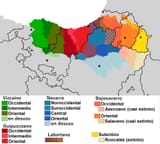Search Results
7/2/2025, 3:03:23 PM
>>149556965
>Getting context like the hill part and wide~big is something you can only get from people that know the language tho.
We have a word for hill, but its just not used, we use mendi for everything.
The Wide/Big situation is widely accepted but its not a rule according to "Real Academia de la Lengua Vasca (Euskaltzaindia)", which is the authority on everything related to Euskara. However as i said is broadly accepted as a synonym when dealing with olden Euskera because its really prevalent in surnames and toponyms while the current word for big (handia) barely appears anywhere.
Also keep in mind that the current form of Euskara is about 55 years old (from 1968). Despite it being (one of the) oldest living languages of the world. We had so many small dialects and derivations on such a minuscule place that the academy had to standardize it, which has lead to a wider approach to the language but also means that a lot of its older foundations might have been lost.
Iñaki is the Euskara version of the name Ignacio, well in fact is the way that name would "go back" to Spanish. Euskara has no Ñ letter but has the Ñ sound, when a word in Euskara has an i before an n its supposed to do the Ñ sound "ny" so it probably was adopted as Inaki first then eventually standarized with the Ñ into Iñaki. The surename is Caña, which just means "reed" or "straw" etc.
Arteta is simpler
Arte = Holm Oak (Quercus ilex). Encina in Spanish.
Eta when used as a suffix is a way to denote a place "with a lot of". So Arteta would be "Forest of Holm Oaks" (Encinar in spanish)
>Getting context like the hill part and wide~big is something you can only get from people that know the language tho.
We have a word for hill, but its just not used, we use mendi for everything.
The Wide/Big situation is widely accepted but its not a rule according to "Real Academia de la Lengua Vasca (Euskaltzaindia)", which is the authority on everything related to Euskara. However as i said is broadly accepted as a synonym when dealing with olden Euskera because its really prevalent in surnames and toponyms while the current word for big (handia) barely appears anywhere.
Also keep in mind that the current form of Euskara is about 55 years old (from 1968). Despite it being (one of the) oldest living languages of the world. We had so many small dialects and derivations on such a minuscule place that the academy had to standardize it, which has lead to a wider approach to the language but also means that a lot of its older foundations might have been lost.
Iñaki is the Euskara version of the name Ignacio, well in fact is the way that name would "go back" to Spanish. Euskara has no Ñ letter but has the Ñ sound, when a word in Euskara has an i before an n its supposed to do the Ñ sound "ny" so it probably was adopted as Inaki first then eventually standarized with the Ñ into Iñaki. The surename is Caña, which just means "reed" or "straw" etc.
Arteta is simpler
Arte = Holm Oak (Quercus ilex). Encina in Spanish.
Eta when used as a suffix is a way to denote a place "with a lot of". So Arteta would be "Forest of Holm Oaks" (Encinar in spanish)
Page 1
